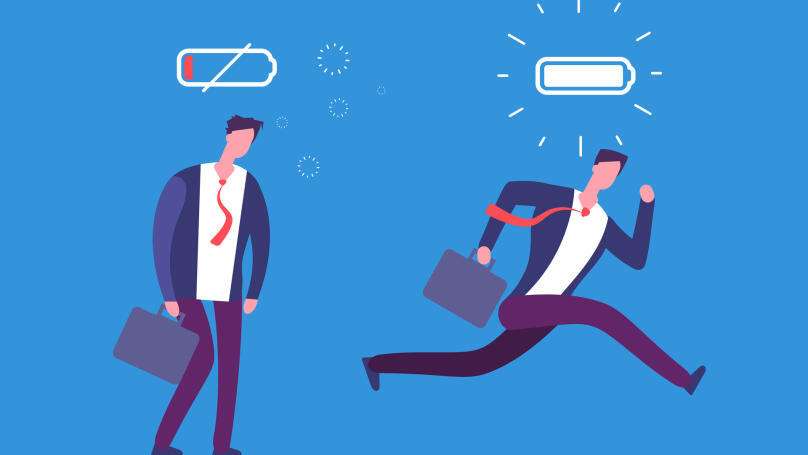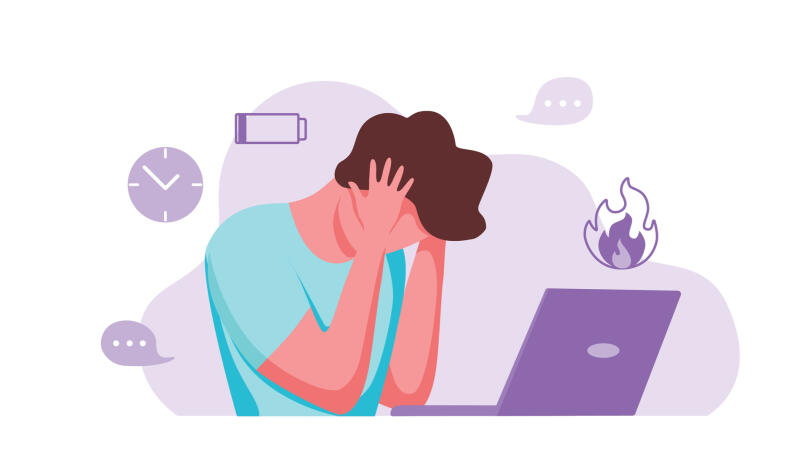Burned out at school. What is burnout and how can you prevent it?
Students often find themselves in stressful situations, such as moving to another city and taking exams. Prolonged stress inevitably leads to burnout.

Students have been familiar with the problem of academic burnout since ancient times, but they began to study and fight against it relatively recently. How can someone overcome such a state when they are physically and mentally exhausted? And how do you know when it's time to stop and take care of yourself?
Why do students burn out and how do you know if you are at risk for burnout?

In 2019, the WHO included burnout as an "occupational syndrome" in the International Classification of Diseases (ICD-11). The name may give the impression that only people who are already working in their profession are susceptible to the syndrome, but this is not the case: those who are just mastering their profession can also suffer from burnout. The term "academic burnout" is used to refer to the burnout experienced by students.
In fact, any emotional burnout is a consequence of chronic stress. Stress is not necessarily work-related. It can also arise from poor relationships with coworkers or bosses. Students sometimes experience stress for other reasons. For example, due to difficulties in mastering the material, poor grades, etc. The situation can be aggravated by a change in their place of residence and difficulties in relations with teachers and other students.
Those who work in "person-to-person" jobs are most susceptible to professional burnout. Teachers and doctors are at the top of the list. Students of these professions often feel burned out and experience symptoms characteristic of professional burnout such as:
- feel motivational and physical exhaustion
- mentally distance themselves from their profession to the point that they begin to treat it with disdain
- feel like dropping out of university
- decreased efficiency
Academic burnout can manifest itself in the form of psychological changes in personality or psychosomatics. The most common psychological manifestations are: apathy, depression, or loss of interest in learning and life. The psychosomatic manifestations of burnout are not easily determined. Most often, problems due to psychosomatics arise with the nervous system and the gastrointestinal tract.
Students who are studying to be doctors and teachers also experience moral pressure. They have high hopes and high demands put upon them. The need to meet these requirements puts pressure on students. Some do not cope with the pressure very well - they begin to experience the same chronic stress that can lead to burnout.
The first step to reduce the negative impact of academic burnout is to understand what causes it. The decision is up to the individual, but some general guidelines will help cope with academic burnout.
Lectera’s Online Courses by topic
Ways to combat academic burnout

Burnout can be caused by objective (external) or subjective (internal) causes. Objective reasons include a student's poor eating or sleeping habits. In this case, the main task is to establish a daily routine and basic nutrition, even if it seems impossible to do this because of school. We have a lot more time than we think. In such situations, the best solution is to learn how to manage your time by mastering time management.
If burnout is due to subjective reasons, for example, the fear of not coping with responsibility, this may require working out the problem with a psychologist. For example, the fear of not coping with responsibility is often associated with low self-esteem. The student needs help to believe in his own strength so that he does not torture himself with endless doubts.
Dealing with burnout is much easier if you identify it early. Christina Maslach, who has developed the most authoritative MBI burnout questionnaire and its version for MBI-SS students to date, identified three stages of burnout. For students these are:
- Emotional exhaustion. At this stage, the student feels a lack of moral strength and is tired of studying; he can hardly cope with the tasks planned for the day. It is best to correct burnout at this stage.
- Irritation or dependence on someone else's opinion. Irritation can be in relation to other students, teachers, or studies in general. Dependence is manifested in the desire to get someone else's approval. For example, do a job in order to be praised (even if it requires a strong overexertion on your part).
- Reduction of achievements. At this stage, a person loses the ability to notice their successes and celebrate them. The student systematically devalues his achievements.
If you diagnose burnout in the first stages of emotional exhaustion you will have an advantage in dealing with it. First of all, you should try to eliminate the influence of negative objective factors. If burnout occurs due to subjective reasons, they need to be worked out. When you are in the first stage of emotional burnout it often means that you only need to give yourself rest and not try to complete all of your study tasks perfectly. More often than not this is enough to bounce back.
Burnout leads to a loss of productivity and ultimately prevents a person from achieving their goals. Students are just as susceptible to burnout as specialists are. Burnout is especially common among those who are studying to be doctors and teachers. Burnout is important to recognize in the initial stage when it is easier to deal with it. If you don't want to be a victim of burnout you need to eliminate the cause of stress and give yourself time to recover.
Share this with your friends via:
Latest News

In the UK, £23 million has been allocated for the expansion of the EdTech Testbed program — pilots of educational technologies in schools and colleges.

In the US, Tuskegee University announced the launch of Tuskegee University Global Campus (TUGC) — a new online platform for distance learning.

A significant stage in the development of the alternative education system has begun in West Northamptonshire in the UK: the County Council is actively calling on parents, guardians, and trustees to participate in shaping the future of this key area.

Outwoods Primary School in Atherstone, Warwickshire, having experienced deep sadness after the loss of their famous cat, Silla, has found solace in a new pet – a Maine Coon named Aloysius O’Hara.

In modern universities, artificial intelligence, and in particular ChatGPT, is rapidly transforming from a controversial tool into a full-fledged student assistant.












 Spring skills audit: what to remove, strengthen, and “sow” in learning
Spring skills audit: what to remove, strengthen, and “sow” in learning
 9 Career Mistakes Young Professionals Make
9 Career Mistakes Young Professionals Make
 £23 million allocated for the expansion of EdTech Testbed in the UK
£23 million allocated for the expansion of EdTech Testbed in the UK
 Test: How Psychologically Mature Are You? Check Your Inner Foundation.
Test: How Psychologically Mature Are You? Check Your Inner Foundation.
 Test. Check Your Social Media Dependency Level!
Test. Check Your Social Media Dependency Level!
 Test: What Business is Right For You?
Test: What Business is Right For You?
